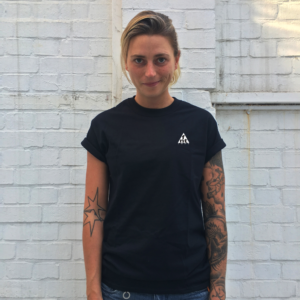Interview Steven Vogel – Black Lodges
„I am the biggest misanthrope among all“
I met Black Lodges owner and curator Steven Vogel in his apartment in Hamburg St. Pauli on a not so warm weekday in early spring. The reason was the upcoming Black Lodges x Sneakerfanten Collaboration, which will pay honor to traveling, withdrawing or whatever you want to associate with it and not at least the very early years of Nike ACG. We both where busy but we managed to spent two hours of our time for the following intense conversation after having a little smalltalk about Hamburgs transformation during the last 25 years.
Q. Hello Steven, the quote on the shirt for the upcoming Black Lodges x Sneakerfanten Collaboration Be yourself, somewhere else – is a typical Black Lodges statement.
S. Absolutely. I am the biggest misanthrope among all. No, leave me alone! That is the constant struggle I am in. I always like to capsule myself. Zero interest in anything else. And especially when I released that streetwear book back then. Respectively Thames & Hudson had brought it out. That literally went through the roof, 120,000 books were sold off. It came out in 2006, where I had already finished with this topic.
At the time, the streetwear boom was not big at all anymore since this whole menswear story suddenly popped up. And now it’s the big issue again. I am like: Did I miss the boat for 20 years? What’s going on here?
Before that, I worked for streetwear today and I did a street culture exhibition in Berlin with the two guys. From 2003-2005. Thames & Hudson came around the corner, a giant publisher in England, and asked if I wanted to write a book.
I wrote this Streetwear book quite innocently. It was much too successful then, it went so far that people had stopped me on the street. In NY, in fuckin LA, and I did not realize it at all. I was still young, 26 years old. And I was like this: Nah, that’s not mine.
And then I withdrew. After that I started working for my agency and worked in the background for Burton, Carhartt, Edwin, Levis etc. Ironically, the brands had only hired me because of that shitty book. They wanted to have a fuckin poster boy, who then creates the credibility outside. What I never understood and never wanted.
After eight years, I finally pulled the plug and said: Nah, fuck off! I just want to live in peace. Then I came from London first to Cologne, then Berlin and then to Hamburg. Because I knew that I could work internationally and earn the money, but still live anonymously.
Therefore, maybe there is the root for this misanthropic, because I just do not bother to people who think that hype is cool. Yes, ok, it’s part of business, but I’m not into it. I’ve never seen a job in it. I did it because I think it’s cool.
Then I worked in a skate shop in England just because I enjoyed it. And then it started that people found you cool just because you wore the right T-shirt. That was exactly the reason for me to say, after this streetwear book, that I have no interest whatsoever and I’m not good at it either. I want to design my stuff, and I am done. I want to walk through the streets without anyone wanting something from me.
The first years of Black Lodges
Q: And then you started with Black Lodges?
S: That started a little earlier. In 2003, I started blogging on Hypebeast. Blogs? Cool, you can do what you want, because you have no advertisers you have to satisfy. I learned there the first cornerstones for blogging. But then I noticed quite quickly that I’m not really that interested in what people are talking about.
Although I like to wear sneakers, I was never a collector. I never had this: I MUST have these shoes. Nope. Although I get Vans sneakers for free, that’s cool. But that stays that way. And then I thought so, look, Kevin has set up a website called Hypebeast here, I can do that too. Hot. And then I started Black Lodges. As a blog. It was mainly about politics, music, art. And the part went totally crazy up to the point where I suddenly had up to 70 other bloggers. And to the point that I interviewed people like Minor Threat’s and Dischord’s fuckin Ian McKaye at the time Nike ripped the Minor Threat poster for Nike SB. Such magnitude had it all at once.
Shortly after that my son was born, and I thought: Fuck, I need a break. So I literally pulled the plug out of the whole thing. And just shut down the whole blog. I’m annoying the scabies until today that I had said in a short-circuit reaction at that time: Okay, I delete everything. This has been very annoying because it was so much cool content on the page which would be relevant again today. It’s all gone.
It all happened around 2010, when it became apparent that blogs had become serious business. Since I had neither the ability to build up a brand, and had thought, for my opinion anyway no one is interested, I have then left.
Q: And then you started with the shirts? Or was it already happening?
A: No, I have been really serious with the clothes only for two years. The first shirts dropped around 2007. But that was really just for the streets. So: Hey, I’ll do T-shirts. I sell the shit and half a year later I make new motives. I did not take it seriously because I did not have the self-confidence in the things I was up to. I was always hired for other brands. I got money to do what I want, but I never put the switch to say: I can do it for myself, too. That came much later. Separation, divorce, moving. Total reorientation in the world. The freedom to re-think the world. And not to exist in this old construct.
I worked for Sonos for a while, this loudspeaker brand. To earn money and check it out: I’m still up for corporates. I was then totally flashed at first, because they had paid very well for actually bullshit work. But after half a year, I understood for me: This is not where you belong to. Your whole being refuses to participate. Bullshit, total nonsense. And just working for money was just too stupid. Sounds super idealistic, but it was true.
Q: And what did you do for Sonos?
A: I was art director, and I’ve been at marketing as well. And then it was easy: No. I’ve always found it difficult to work with other people, at least on a creative level. And all that agreement and these commitments, so you work eight months on a fucking magazine that could be completed in two days, nope.
That’s what we have now, 2019? It was around 2014/15.
After that, I concentrated on painting. Through my old contacts I got quite fast exhibition areas and galleries in Tokyo and NY etc.
It went very well, but then I noticed again that the pressure of expectation is so high that you have to constantly deliver new shit. For 1.5 years that was ok. But that was too much pressure again. Then I started making T-shirts. Once a month, then twice a month, and then I realized, Fuck! People actually buy the shit! And it pays the bills. So that was really cool. And two years ago, at age 40, I dare to make the step, I’m doing this now full-time. And I’ve been doing that for a good year now.
Q: You also have a decent output.
S: That was my idea of getting a t-shirt out every week.
Q: It is difficult for collectors. (laughter)
S: Yeah, but that’s why I’m doing so many collabs so you do not have to see my shit every week. The original idea of Black Lodges: I thought about a platform where a huge range of anti-art could prevail. I mean I know a lot of great and talented people who produce a lot of great shit but however do not exist in the mainstream. That was the starting point of Black Lodges: To say: Of course there are these hype stories as on Crooked Tongues in former days, where very quickly a kind of consensus is created: This and that is cool now. Where I said: Sure, I understand that, but there is another world from which you also take a lot, let us do things with people who do not want to do a Nike Collabo for example and so on, which are also a bit more socially critical.
That’s the beauty for me, that I managed to continue what I started 15 years ago. I mean that my own shit is selling but that I am able to offer quite a lot of other people who are not settled in the popcultural mainstream a possibility to publish their stuff. And that works! And that is nice! You do not really get rich from that, certainly not, but it’s enough to live in Hamburg, to have an apartment, to send my child to school and also go on vacation.
Q: Are you having a structured workday? Do you have a time during the day when you can work best?
S: Yes, yes, I’m super structured, you will not believe it, it’s totally stupid. I have not been in the past, but for a few years now I have a very structured schedule during the day. But not for the reason that I had to do it, it was more about my physical and mental health. I used to work almost to death, I became very ill in my early 30s.
I was in the hospital for a while. So I asked myself: Where is the balance? What is important to me? Let me just try it: that I work 4 hours in the morning and do physical things for the rest of the day, and then mentally, for example, I write my doctoral thesis. That also consumes a lot of time. I’m glad about doing this but I invest between three and four hours a day. I wake up in the morning, take care of customer shizzle, I’m an early bird, usually get up at six or seven o’clock. Start working until eight-thirty, do that until one o’clock.
Q: You have the ability to break down very complex issues and put them into a few words. You see the stuff, and immediately it has this effect: Yes, just like that, cool. You’re talking to completely different people.
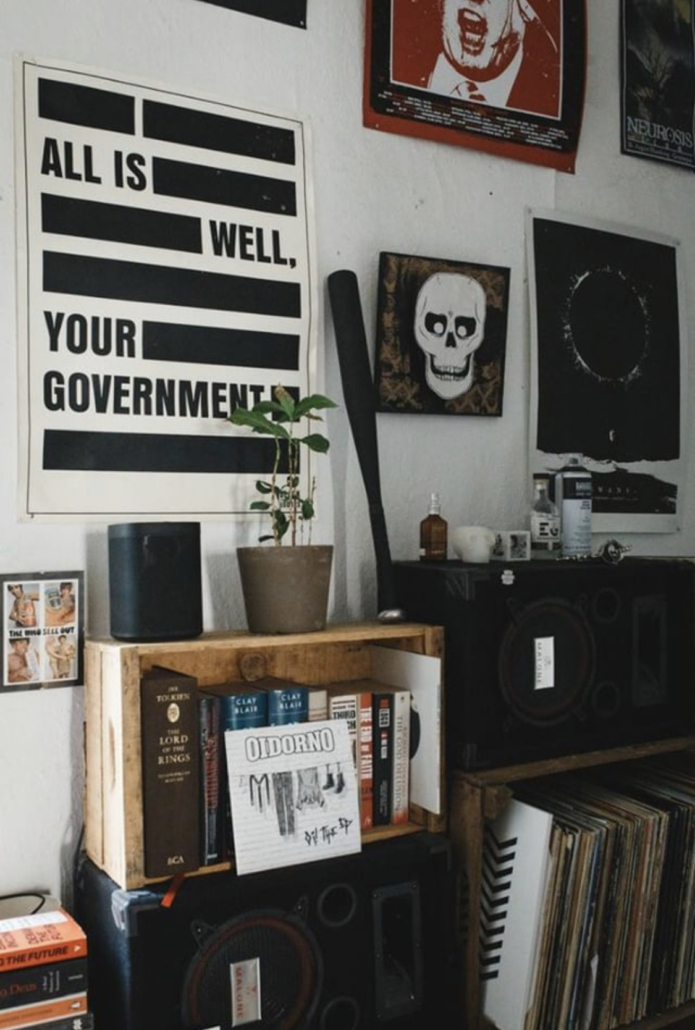 S: Definitely.
S: Definitely.
Q: For example, some friend was really touched instantly when he saw the „Too many Chiefs“ shirt, someone coming from a completely different background. It had instantly made click and triggered something. This motive it has a certain background but you can associate a lot of things.
S: Exactly. The saying came from the musician Brant Bjork, he had written a song titled like that. It was about something else, the relationship between him and his band, that there were too many bosses in the band. He contacted me and asked me: Hey, would you like to make a t-shirt for me? Me: Yes wow, cool, definitely! And clearly, you can see that politically, you can see it socially, you can take it very personally. The sentence itself has been around for a long time.
Q: You once mentioned the political component, too many bosses, too few workers.
S: Yes, exactly.
Academic career
Q: What are you writing your thesis about? You have a scholarship, right?
S: Too great a story, I finished my master at the age of 22. This was the end of my academic career and I’m not very interested in working in academic contexts. However, I got along well with my then professor and stayed in contact with him. There was a lively exchange. Because I truly adore this dear man, I do not mean to say, but I think he is an incredibly brilliant mind who, while a great theorist, is also a very practical person. I find that super interesting.
It’s been a part of my life I’ve been keeping secret for a long time, I have not talked about it. I am very interested in politics and philosophy and their practical application. Throughout the years, I have repeatedly written in various left-wing newspapers, especially in England. Four years ago I wrote an article for „the new statesman“, that’s a big leftist magazine in England, a weekly one by now. The topic: The inability and unwillingness of the old and new left to regain the modernity for themselves. That was my topic: The left does not want to win, they are afraid of winning. Of course, I provoked many people with this. This, of course, was a blatant break with the current, especially English, ideology.
But my Prof thought this topic was hot, and had asked myself: Have you actually thought about a doctorate? No, I don’t , why? I do not need to, do not want to become a teacher, or a professor, and secondly I can not afford it, costs £ 140,000 in England, is also bound by obligations to teach while studying, and so on and so forth. The Prof then asked me to roughly cover my topic for the dissertation on 5-6 pages. He offered me a full scholarship for five to six years at his old university. Like that: I’m your teacher then, you have five years, and you do not have to teach, let’s go. Batz!
Then I thought about it, and then it got me. Why not? Could be really cool. I found the challenge of working scientifically in the philosophical field really interesting. I recognized in the meantime that I its quite a lot of work. Because the claims are so immensely different than when writing a bachelor’s or master’s thesis. A doctoral thesis really wants to and has to fulfill scientific constructs. And yes, whatever, I’m in the middle of it now. And it is cool. And it’s about, in fact, „post-capitalism in philosophy.“ So how can you philosophically explain a world after capitalism? And then not only explain, but: How do you do it? What do you do? Why? And that means in detail: To analyze the mistakes and the successes of the left and right movements of the last hundred years. So a story topic as a basis. And then come up with ideas on how to create a society that does not just work on a small scale but that is scalable. So how can you scale these approaches globally. That’s the topic.
Q: That’s not exactly a micro topic.
S: Yeah, that’s a big topic. What’s great about the whole story is that through this scholarship I have the opportunity to get in touch with very clever and gifted people who help me, and it’s just a hot topic in philosophy, it’s being discussed . One of my starting points is that as a society we first have to talk about a value formula. Then create a new value formula about how we value our lives. What is a value? What are the values that are important for us?
Right now, your value in the capitalist system is based on productivity, then you’re valued, and that’s your life. And I think that’s not okay, and that there should be a bit more.
Half a year ago, I came up with the idea that we actually needed a new value formula that represented not only productivity in the capitalist system, but everything, you as a human being, and we as a society.
And I am currently working with a mathematician from the Humboldt University in Berlin, and that is super interesting. Math is not my strength, and I sit down with him once a week and throw to him lots of things and he sits there and then actually builds out a math formula since half a year, and that’s really complicated.
I really do not understand what he is doing, I have to admit. But that’s the cool thing about the project, that you get in contact with such people. I do not just want a philosophical idea, so: You should, or you could, but Now here, that’s the formula! This includes our whole life, everything that can and must be important to us.
And not only the satisfaction and alienation of man in the system, but really the positive humanistic sustainable continuation of our species. That’s the guide. This is not about left and right. Although I definitely associate with the left spectrum. It’s not about that anymore, this concept of a political spectrum does not make sense anymore, it’s just a tool to manipulate people. It’s about taking that step afterwards.
For me, a nonviolent, humanistic, rational, sustainable society should exist. And that’s where I want to go. It’s so cool, the guy sitting there at his computer and reckons, that’s how it has to be, that’s nice!
Q: Is this something for a book? Actually, one would rather have to make an exhibition out of it, in order to represent it appropriately.
S: Yes, probably. That’s the beauty of philosophy. That it can contain everything. And you do not have to. There is a lot of psychology, history, sociology. Math. Business thinking.
And I find that so important in the philosophy that it does not have to go to a micro theme, but can also treat the big and the whole. I’m just learning a lot of it. That’s what I enjoy. But it takes a lot of time.
Modern Esoteric
Q: You used to think that this whole sneaker thing also has something esoteric, for example. That everyone flees into such niches. There are the coffee freaks, the sneaker freaks, interior minimalism freaks.
All that stuff is actually very nice, but somehow is also contaminated and spoiled. For example, a slightly more critical interview with Steve McDonald (former Nike designer and ACG developer) was not published in a sneaker magazine because it could outrage Nike as an ad client.
So these guys like Steve McDonald, they have done something really cool with a lot of enthusiasm and humor, namely ACG, for a not so correct company. So a lot of people give these companies their money. Me involved. So everyone is involved, more or less.
S: The bad thing is, and that’s my problem with this whole industry, that the reality in which we exist is being deformed. By their desire to make more money. This is wrong and very short-sighted.
These are not some robots who make blatant economic decisions and subordinate everything. I believe these people should really be brought to mind by us: We accept that you exist, as, for example, Nike in our world, we accept that you have an impact on our reality, but let us together, we as consumers, you as producers, talk about how we want that.
I’m very critical, not only about Nike, but also with all other brands. They use their economic power to build consensus that puts them in the right light, even though they do not always do well, at least to my understanding. That’s such a pity.
In theory, one could talk about it, there is nothing in the way. Hey Nike, I think you’re great, I want to buy your products, but I’d like to buy them if you do that and that. There is no possibility for a dialogue. If you write something critical as a journalist, on the contrary, you will be shot down immediately.
Q: Yes, and it was not that critical. Just a few sentences. At first, the article was reduced to one page, then not printed at all. At least there is no real content in these magazines.
S: Yes, that’s bad. Couple of pretty pictures, a bit unimportant text. But journalism has been dead for a long time. I got the happy ending back in the late ’90s when I had worked at a magazine. Where you as a music critic still had room. At some point it just tipped over, as more profit should be made. A fundamental topic: Should media make a profit? Does the media landscape have a responsibility to society as a corrective of industry and politics? Or do they exist only to make a profit?
If they exist to make a profit, they are no longer any media that serve the corrective purpose. For example, the public channels powered by the state, which are also influenced by external sources, do not think and act in the sense of the corrective. But they are still good, and if you look at the discussion in Austria: That we do not need a public media service. That makes me crazy. It is incomprehensible.
In the United States 272 people are supposed to own all the media. Fuckin insane. You have to imagine this.
Q: At the same time, it’s been sold as complex. For example the weekly German paper Die Zeit. One does not manage to read everything in a week, and there is also good stuff in there.
S: Yeah, there are working some clever people, sure. Yes difficult, difficult topic. And again on your topic with the niches. People want to hide in niches, absolutely. The internet has made it possible. The world is a fucking oyster. You can find something everywhere. You could do that earlier, but you did not have any other idiot to share your stuff with. That was boring.
Now you can say: Hey, I totally love Hello Kitty Nike Prestos, maybe there are six of them in the world. You then post this on the internet, and suddenly find 3000 people who say: Yes man! Me too! And then you masturbate on it. So this niche story is really a blatant phenomenon.
Q: Yes, exactly, for example with this whole third wave coffee scene it is just extreme.
S: Jou! (laughter)
Q: This whole movement- it tastes great, these new roast types. But this also has its own esotericism.
S: Definitely!
Q: It was totally different, drinking coffee in public. Like you went to the Portuguese and had your galao …
S: And you where happy when the coffee was still warm! (laughter)
Q: And you did not spoil your stomach.
S: Yes.
Q: And now you get your coffee from the lab, filtered osmosis water, served by young guys.
S: Basically, I think it’s good too, there’s a lot of great stuff. They not only taste good, but also take up the subject of sustainability. And they arereally working together in solidarity with the farmers on the global level, I think that’s really good. It is practical. I once made this coffee collabo with Ozon Coffee. From New Zealand. They bought the plantations in South America and turned them into collectives. And given the workers a fair share. They now have 27 stores all over the world. Mega! Four plantations, Guatemala, Equador. The act as a collective, and that is so Bäääm! Really cool. Mega. Great development.
But niches are also problematic, niches can lead to alienation according to Marx. This alienation in Marx’s sense is actually a psychological danger to man. We are just social animals. Social contact and social affiliation is extremely important. For mental health.
Q: Even if you like to withdraw, at some point you have to get out again. You can try to sit alone in a cave for a while, until you eventually go crazy.
S: Absolutely. Also Thoreau, the most famous misanthrope in the world. He also had friends and acquaintances who enriched his life. Not so many.
Q: Even an Autist needs close people whom he can rely on.
S: Total. That’s totally important. That’s one of the results of niches, that alienation. The more you find yourself in niches, and I am also very big in it, I exist only in niches. If all the people in your house are interested in twenty thousand different things, there’s no consensus anymore.
Q: Bubbles.
S: Right, Bubbles. The big question is, are these bubbles wanted? Since one could arrange a conspiracy theory and say: Hey, is that purposeful? Because alienation also means disempowerment because only the masses have power.
Q: There are so many social codes. This already starts at the Kita playground. Clothes, language, you sort and judge each other immediately consciously and unconsciously.
S: Exactly. What sneakers do you wear? It is so bad. (laughter)
Being creative
Q: completely different topic. Your design language. You have recently reissued an older Black Lodges theme.
S: Yeah, that was originally a shirt design for the Deftones. I have been working with the Deftones for 17 years. There are some special dynamics in the band, there are three teams or camps within the band. One part says: Steven Vogel, yes. The singer basically says: Nope! The guitarist says: More evil. And that was an example when they could not agree, and when one says: We don’t do this, it will not be done.
That’s right, completely different imagery, the motif, very complex. When I started using Photoshop and Illustrator, I experimented a lot. Your own style is constantly evolving. Not necessarily progressive, but just in every direction.
I have already made a lot of shirts, where I’m totally different from my mind, compared to the stuff that will be released. I’m mostly bringing out stuff where I know they’re selling because I have to pay the bills like any other person. And try to bring things out in between which correspond more to my desired aesthetics, which I myself can not fulfill, because I still do not master the technique. And some styles do not have any success at all. I released a shirt earlier this year. Could not do it the way I wanted, because I still lack the technics, and it really did not interest anyone. Not one single person ordered it.
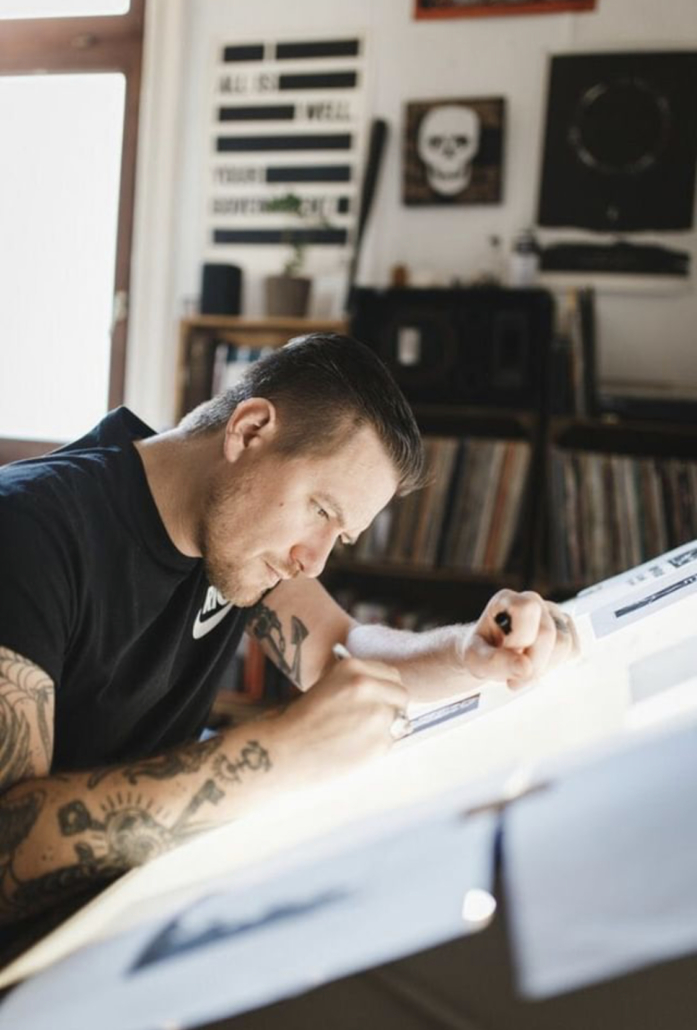 Q: For real? Which one was that?
Q: For real? Which one was that?
S: That was a mixture of philosophical texts and 80s Tron oriented graphics. I thought that was awesome, but I only got Hatemail, like: What are you doing? Get the skulls out!
F: Interesting! Then there are really rare pieces out there.
S: Yes, sometimes it’s only three shirts which I sell, and I can not influence it at all. Really weird. When art is tied to commerce, it follows the rules of the consumer. For me, it’s often the case that the things that sell well do not really interest me anymore. It is just the way. It’s nice, but my head as an artist is not fulfilled.
And the thinks that I think are really cool, that take me further, often do not go well commercially. Sometimes yes, sometimes not. Super strange. I notice that I currently spend more time on the computer as with drawing. That’s because I do not master it. I’ve never learned graphic design, not at all. But I’m just interested, I would like to learn a little bit more.
Q: That’s time consuming.
S: Absolutely, and if my head is full of references that I want to translate, then break that down to three four words, but also in the graphical language, wow! I pull my hat off so blatantly to people who can do that. Travis Kane, for example, holy shit, so on point. It will take decades before I get there.
The ACG Connection
Q: Okay. another change of topic: Do you have any connection to Nike ACG?
S: Yes, I actually have. My dad was my connection. He was an enthusiastic amateur triathlete. My grand cousin had been working at Runners Point in Hamburg Altona. That’s the connection, I always liked what they did. My first real sneakers were Nike ACGs from the said Runners Point store. I just loved the subject and I love to be outside. I do like sports, but I’m not an athlete in the sense, I like climbing and mountaineering, for example.
The aforementioned grand cousin emigrated to Morocco in the mid-90s to become a mountaineer in the Atlas Mountains. And he’s still there, I visited him a few months ago. And he lives very deep in the Atlas Mountains as a mountaineer. Earn money with group tours. He had a big influence on me at that time, he was a dead ass cool bloke. Long hair and smoking weed and just on the edge. But he was still an athlete. No an athlete as Nike likes to present, basketball player, athlete or runner. For him, this ACG topic was really great at the time, because he was in the mood for things. And I also found it very interesting, when back then, I think around 2004, this whole Considered line came out.
Q: Yes, the Nike designer Steve Mc Donald, who was mentioned earlier, also participated in the development of the Considered line.
S: really cool! And when that came out I thought: Okay Nike, now you have me again. The sustainability idea behind it was great. The shoes were cool. That’s been dropped by Nike, right? Does not exist anymore, Considered?
Q: Among other things, it was about not glueing the shoes anymore, so that these poisonous glue can be saved by just constructing the sole parts so they can be put together without glue, and techniques such as these were partially adopted and used to this day, but no longer under the Considered label, or they just call it Considered Design.
S: Great. I always liked this claim, this connection with nature. And away from: I am a professional athlete, to: I like to be outside, therefore need hot shit. Also the stuff from Nike for the Special Forces I found super interesting at that time.
I also served for two years in the army and have had various experiences, what the demands on footwork bring with it. Gary Warnett had told me that back then, GWARIZM, who had sent me a link: Ey Steven, look here, Nike is building shoes for the Delta Forces. I was like this: Boah, awesome! The applications that you have as a manufacturer I find almost more interesting than the latest hype shoes, so this is why I found ACG so interesting.
Q: Yes, and as Steve Mc Donald mentioned, Nike did not really push the ACG line at that time, the managers where not really that interested, it was all about Jordan but they were allowed to do their thing.
S: Haha, yes, cool.
Q: And this whole considered line was probably not very profitable commercially. Not many people understood that back then, the whole formal language. I still remember how the stuff in the shops died in the sale sections.
S: Yes, zero. But it was cool. They where not the most beautiful shoes, but I liked to wear them. I interviewed Sandy Bodecker from Nike back then, who was involved in that as well, before he brought up the whole Nike SB thing and he put the pieces on the table for me. And he’s like this: Here, look at this. And I like this: What ?!
The visual language was great.
Q: Yes, exactly, this moccasin with the braided Toebox.
S: Yes, that was the connection back then. Great stuff.
Q: And what do you think of the recent developments? For example Errolson Hugh of Acronym who had made several ACG lines? Do you still pursue such things?
S: Yes, I’m following this.
S: Does it interest you?
S: No, not really. I know Erolson from Burton times, he worked at Burton at the same time as I did as a designer. Erolson as a designer is very capable. I do not like how he presents himself. That is very strange to me. It’s a very blatant personality cult that rules there. It’s just not what I like.
Q: Yes, this iconic elements in the presentations.
S: Exactly, it’s very much about him, not about what he’s doing. It does not appeal to me, and I am glad that he has this job. And I think it’s good that Nike pays people like him. They are allowed to experiment. But I do not care.
Q: Unfortunately the quality of many things is not very good either. After a few washes the gear is washed out and out of shape. And overpriced. I tweeted him about it, he said that he was not responsible for the quality, but Nike.
S: Really? Wow. I’m not responsible for that. That’s a pity.
Q: Steven, thank you, that’s it for now.
S: Yes, haha, it’s a lot. Well!
(photo credits Ben Gutheil)

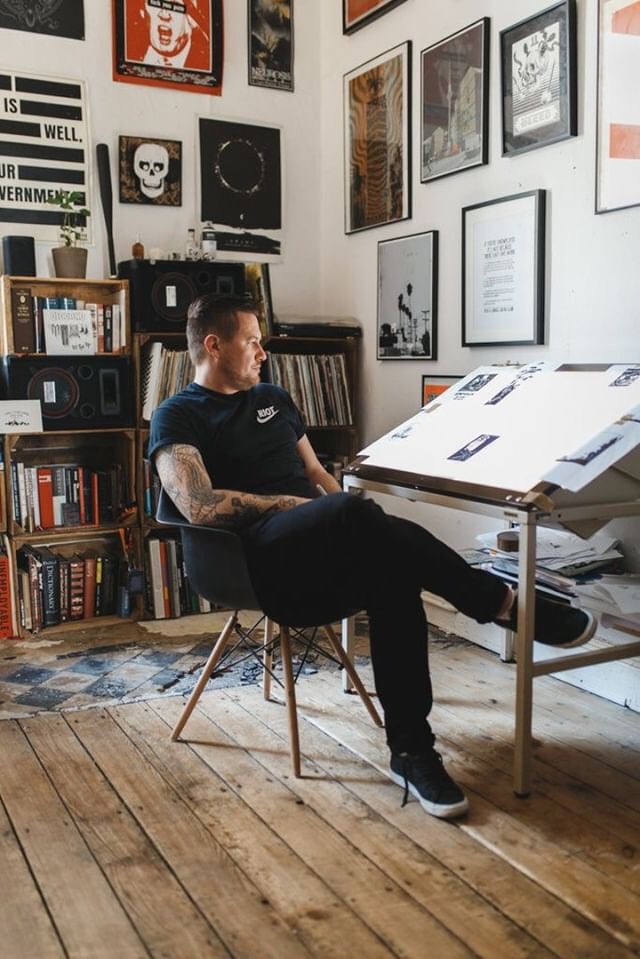










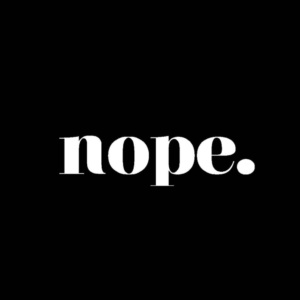


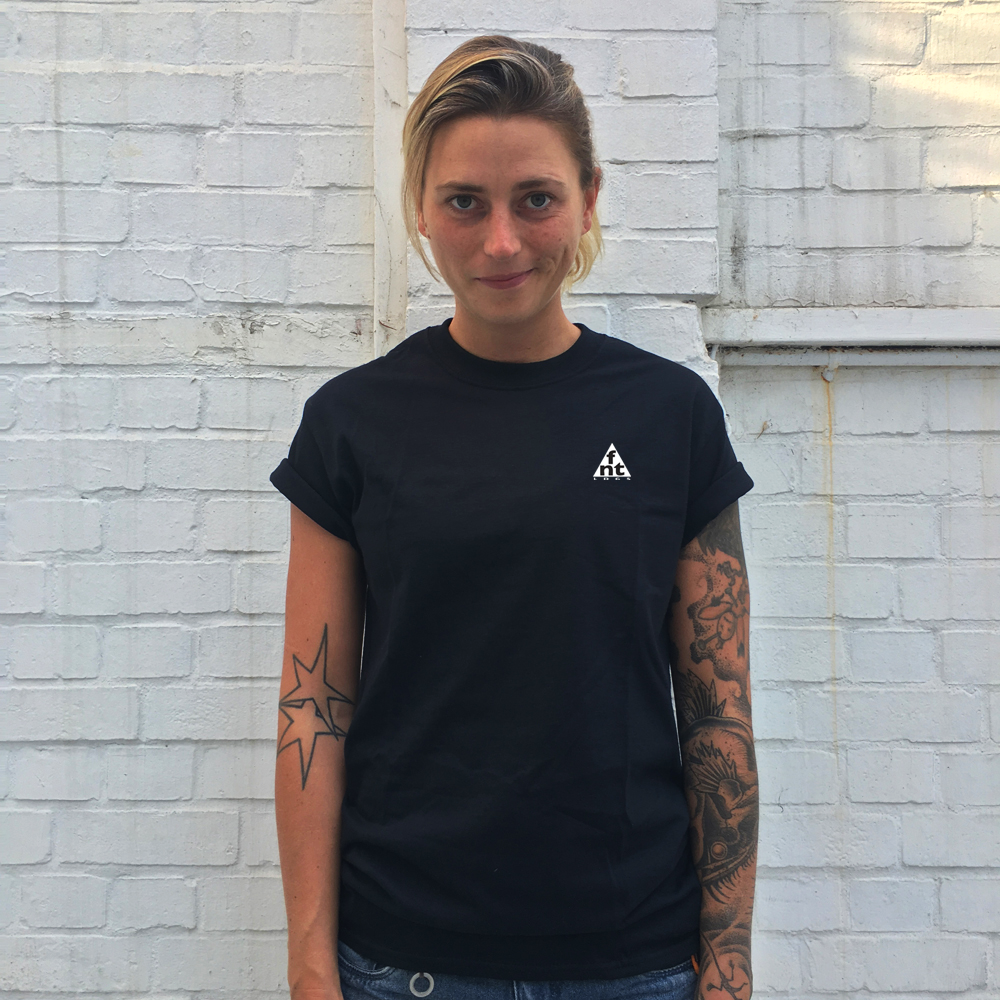

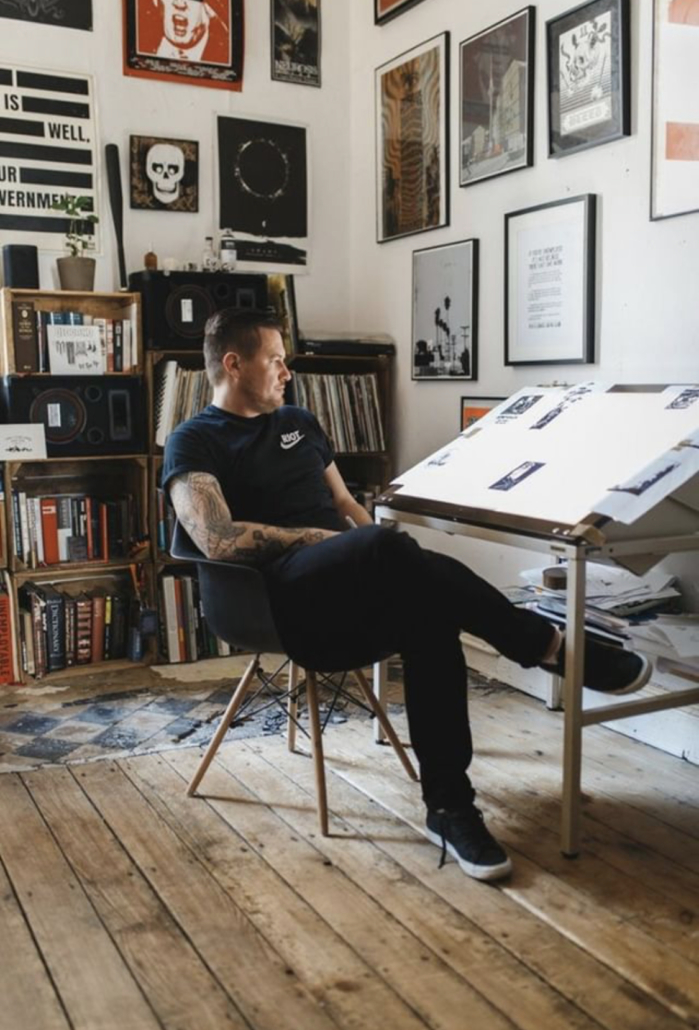 Q: And then you started with the shirts? Or was it already happening?
Q: And then you started with the shirts? Or was it already happening?
